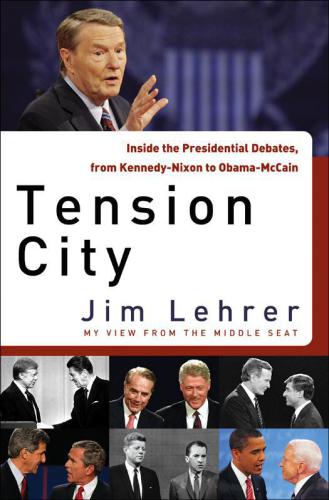
Tension City
Inside the Presidential Debates
کتاب های مرتبط
- اطلاعات
- نقد و بررسی
- دیدگاه کاربران
نقد و بررسی

June 6, 2011
In 1960, when Richard Nixon and John F. Kennedy took part in the first televised debate between presidential candidates, they ushered in a new age of media politics. In this history-cum-memoir of serving as the longtime moderator of the debates, Lehrer describes this intersection of politics, performance, and journalismâwith plenty of delicious behind the scenes details. Interviews with candidates reveal their love or loathing for the ritual of the presidential debatesâGeorge H.W. Bush decried its " artificiality," while Bill Clinton, unsurprisingly, "spoke with detail and delight about his experiences," like "a master politician talking shop." Students of politics will enjoy many key reference points, from Ronald Reagan's "There you go again," zinger against Walter Mondale in 1984, and Democratic vice presidential candidate Lloyd Bensen's evisceration of his opponent, Dan Quayle: "Senator, I served with Jack Kennedy. I knew Jack Kennedy. Jack Kennedy was a friend of mine. You're no Jack Kennedy." But only hard-core media junkies of a certain generation will care about the price of the tie that Lehrer wore for the 2004 debate or find the same drama in moderating that Lehrer does: when he was asked to oversee his 11th debate, despite recent heart surgery, Lehrer writes, "Ego impulses aside, the real reason was that I wanted to do it. This was what I did. I was a moderator."

June 15, 2011
Award-winning NewsHour anchor Lehrer (Super, 2010, etc.) discusses the televised presidential election debates he and others have covered.
The author, who first moderated a debate between George H.W. Bush and Michael Dukakis in 1988, reports that most candidates believe that elections are not won because a candidate performed well in a debate. However, a campaign can certainly be pushed toward defeat by a poor performance before the cameras. In Lehrer's experience, such effects are not often brought about by "gotcha" questions, bloopers or flubs; what counts is how the camera reveals body language in that particular moment and circumstance. In America's first televised debate, between John F. Kennedy and Richard Nixon in 1960, the camera showed Nixon's sweaty face and stubble, so different from Kennedy's healthy look—tanned and plumped up from his treatment for Addison's disease. In 2008, as John McCain refused to respond or even look at his opponent, the hostility appeared almost palpable. In 2004, the camera caught images of an impatient-seeming George W. Bush, and in 2000 it focused on the condescending sighs of Al Gore. In 1992, George H.W. Bush was captured checking and rechecking his watch. Lehrer didn't necessarily notice these defining moments as they were occurring, but rather looked at the debater as he answered the question. He was careful not to appear to fall into the trap of establishing rapport through eye contact. Though Lehrer's recollections are nostalgic and often insightful, many readers may wish to learn more about how he puts his questions together and how that skill relates to other behind-the-scenes skills.
A limited but entertaining peek at some of what goes on behind the curtain.
(COPYRIGHT (2011) KIRKUS REVIEWS/NIELSEN BUSINESS MEDIA, INC. ALL RIGHTS RESERVED.)

April 1, 2011
Former president George H.W. Bush once told PBS News anchor Lehrer that the presidential debates were "tension city," though if Lehrer himself felt that way, it never showed. Dubbed the "dean of moderators" by CNN's Bernard Shaw, he has held sway over 11 presidential debates with enviable aplomb. Here he recalls those debates, detailing how the candidates prepared and how they fared. This should be an eye-opener from someone who saw it all up close and personal.
Copyright 2011 Library Journal, LLC Used with permission.

June 1, 2011
Tension city was how presidential candidate George W. Bush described the impending debates. Presidential debates have indeed been filled with tension for the candidates and the moderators and journalists involved. Lehrer, news anchor for The NewsHour on PBS and the moderator of many of the debates, offers a behind-the-scenes look at the process. Drawing on interviews conducted over 20 years for a PBS oral history, Lehrer chronicles the nervousness of candidates and journalists, regrets and triumphs, and the maneuvering for advantage on everything from seating to lighting; he also recounts problems with audio feeds and locations. Among the memorable recollections: Reagan attributing his confusion during his debate with Mondale to overtraining rather than exhaustion; Ford and Carter offering sports metaphors in recollections of the adrenaline flow during the nerve-racking debates; anger among women reporters at the question posed to Dukakis regarding his reaction if his wife were raped and murdered. Lehrer's recollections from Kennedy-Nixon to McCain-Obama include fascinating postmortemsof one of the most defining processes in American politics from every candidate except Al Gore, Ross Perot, and Lloyd Bentsen. HIGH-DEMAND BACKSTORY: This is the twenty-third book by esteemed journalist Jim Lehrer, who has moderated 11 debates over the course of the past six presidential elections and here provides an inside look at the process.(Reprinted with permission of Booklist, copyright 2011, American Library Association.)

























دیدگاه کاربران